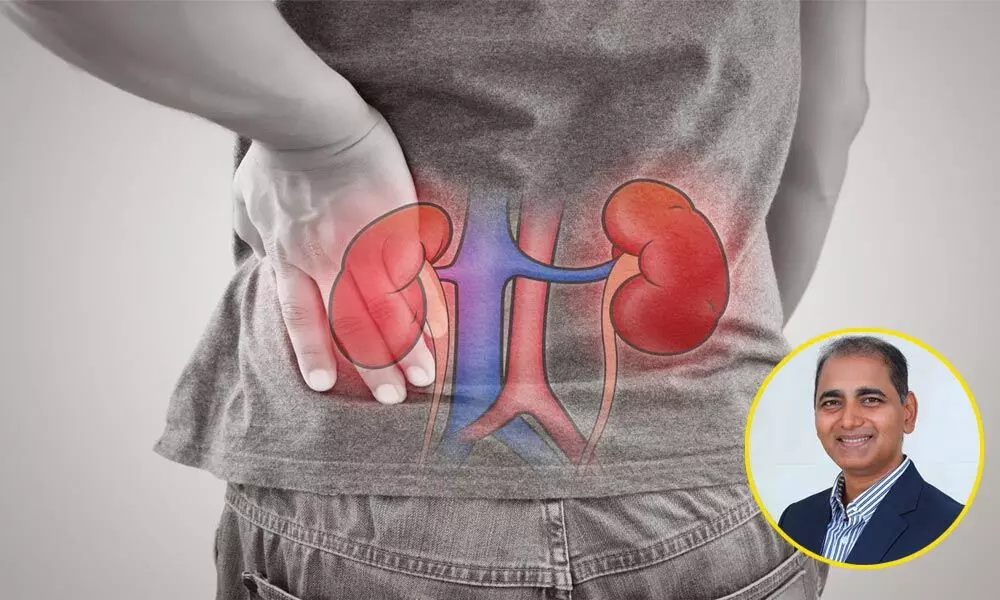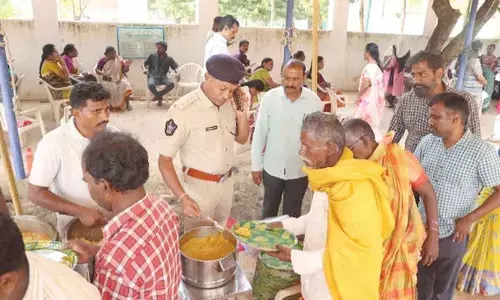Excess use of painkillers leads to kidney diseases: Expert

Excess use of painkillers leads to kidney diseases: Expert
People should get their blood urea and serum creatinine tested when they have symptoms like fatigue, loss of appetite, swelling of legs and face, fractures. They should start treatment immediately if required, says Dr S Sridhar Reddy
Ongole: The excess use of pain killers with no knowledge of proper healthcare, fluorosis in some pockets of the Prakasam district like Kanigiri, Pamur, Bestavari Pet, Tangutur and others is resulting in the increase of chronic kidney disease cases.
As 'World Kidney Day' is being observed with the theme 'Living well with kidney disease' on Thursday, the experts suggest that knowing the disease and changing lifestyle with a positive attitude will help the kidney disease patients to live well and lead regular life happily.
Speaking to 'The Hans India', the consultant nephrologist at Ramesh Sanghamitra Hospital in Ongole, Dr S Sridhar Reddy explained that with improper medical education, most of the primary health providers in villages are giving unnecessary pain killers to the people.
He observed that with the increase in non-vegetarian food, dehydration is slowly damaging the kidneys. He said that people should get their blood urea and serum creatinine tested when they had symptoms like fatigue, loss of appetite, swelling of legs and face, fractures, to know if they are a victim of kidney disease and start treatment immediately if required.
He informed that uncontrollable hypertension is a major symptom for 2nd and 3rd stages of kidney disease, while the additional symptom of decrease in blood levels suggest that stage 4 of CKD is also started.
The doctor said that the damages to kidneys cannot be repaired, but their life span can be improved with a change in lifestyle, regular medication and cooperation from the patient and his family.
The nephrologist advised that the people with diabetes and hypertension for more than five years, to regularly check their serum creatinine and blood urea. If the creatinine value is more than 1.5 for more than three months and the blood level and kidney size are observed to be decreasing or the calcium, phosphate and uric acid levels are increasing, he said that the kidneys are in the process of damage and treatment should be started.
He added if the disease is identified in stage 1 or 2, the patient can live up to his normal life span even after treatment for a while, but with regular use of medicines if the disease is identified in state 3 or 4.
If the disease is in the advanced stage like stage 5, dialysis is required and the patient may survive for 6 to 8 years, he added. He said that if the kidney is transplanted, the patient can live up to 20 years, by taking care.
Dr Sridhar Reddy said that the pandemic due to coronavirus has made many kidney patients suffer to the worst. He advised the people suffering from kidney disease and their family members to improve knowledge on the disease and the condition of the patient, modify the lifestyle by including a healthy diet, exercise, regular checkups, develop a positive attitude to slow down the disease.
The doctor announced that for the next year, observing the World Kidney Day theme 'Live well with kidney disease', they are going to create awareness among the patients and their attendants about the disease with the education material, knowledge share sessions, counselling to family members and encourage the patients to continue their hobbies and professions to motivate them towards positive attitude. He said that kidney disease patients can receive the treatment and even get transplant from their live relatives under Dr YSR Arogyasri.

















